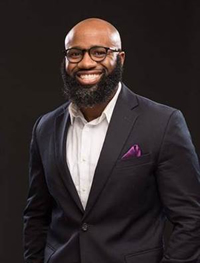Find a CBT Therapist
Search through our directory of local clinicians.
Shawn Jones

Researcher Spotlight
Assistant Professor at Virginia Commonwealth University
How did you first become involved in research? What was this first research experience like?
I actually have the “Pre-med” convert narrative to my career as a psychologist, so I did not have my first research experience until the summer of my junior year in undergrad. I was selected as a NIDA intern and was able to do secondary data analysis investigating multilevel factors contributing to youth substance use. The experience was as awesome as it was challenging. It allowed me to take my tacit knowledge (sometimes referred to as “me-search”) and fortify it with theory to better understand individual (racial identity) and parental (monitoring) protective factors. It was also my first time engaging in statistical analyses, which, admittedly, initially made my head spin. However, after being able to present my findings at a national conference and get valuable feedback from senior psychologists in the field, I was hooked!
What have you found most rewarding about your research?
My program of research focuses on racially relevant risk and protective factors for Black youth and their families. Over my career to date, I have utilized quantitative, qualitative, and mixed methods to investigate the relationship between constructs such as racism and racial discrimination, racial identity, and racial socialization. I personally enjoy the entirety of the research process-from identifying a topic of study to publication. However, without a doubt, the most rewarding aspect of my research has been when my team or I receives feedback from the participants with whom we work. This may take the form of a simple, “this is so cool” during a funneled debriefing of an experimental paradigm to a “We honestly have never thought about discussing this with our children. Thank you for this work” email message a week after a dyadic interview. This is particularly rewarding because it reaffirms the mission of my program of research in a way that a journal article acceptance or significant p-value cannot replicate. It shows that the work matters.
What does an average day or week look like for you?
As a first year, tenure-eligible faculty member, an “average” week consists of a balance of research, teaching, and service. With regard to research, I write daily Monday through Friday for at least an hour (this is typically the first thing on my calendar most days). I also hold weekly meetings with my research team and bi-weekly meetings with the senior members of my research team (we hold a writing accountability session on the off weeks). I also meet with my graduate student weekly. Currently, I teach a course (Intro to Psych) that meets Tuesdays and Thursdays for 75 minutes. I also hold two, one-hour open office hours. I also typically have some sort of college, departmental, or program-level meeting to attend. I am also part of a weekly writing accountability group with my peers (Wednesday mornings), hold a group supervision session once weekly, and try to attend a campus event if I can!
What is one challenge about your research that you didn’t anticipate before you started the work, and how have you dealt with this?
Particularly in quantitative approaches, we are often trained to view research as objective and, in some cases, “values free.” However, in my own research, I have come to recognize that there are values in the research that we take up, and that rather than attempting to dismiss them, we should recognize and attempt to speak to these in our work. This has primarily played out for me in the form of certain ethical quandaries in which I have found myself. Not ethical in the sense of getting institutional review board approval, but a deeper sense of “is this THE best way to do this.” For example, I have been challenged when exposing college-aged participants to a laboratory based racial encounter, wondering if the science justifies the potential impact of said experience. I have wrestled with how to broach with parents that, although we still value understanding how they talk to their children about race, the literature “isn’t quite there” to yet give definitive guidelines. Admittedly, I have not completely “dealt” with this challenge; it is a process. However, I try to remember the down-the-line benefits of the research, take measures to ensure that I am doing the most just work possible, and check in with my participants about their experience with the research they are being asked to do.
If you weren’t pursuing a career in psychology, what would you be doing?
This is a hard one! I think of three things. 1) From an early age, I was very concerned with two things: helping others and understanding why things happened the way they did. 2) I really enjoy the melding of art and science. 3) I love food! Combining those three points, I would say that if I were not pursuing a career in psychology, I would consider becoming a culinary chef and opening up a restaurant. I think that food is something that certainly brings people together and has a great balance of creativity and skill. My restaurant would center around, you guessed it, conversations and would have a family-friendly feel!
